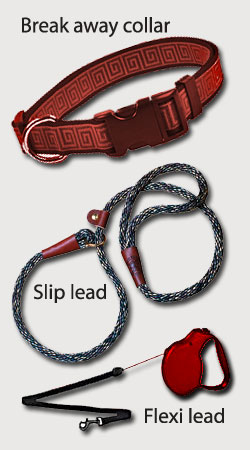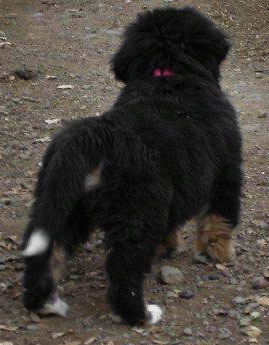Things to buy for your new Berner puppy
New to dogs?
First recommendation - purchase a book on veterinary care. Be your dog's best friend. Aids for health management advocates are great tools for any Berner owner.
Veterinary Care Books
Dr. Nancy Kay � "Speaking for Spot"
http://www.speakingforspot.com/
"Dog Owner's Home Veterinary Handbook" (at amazon.com or other booksellers)
"The Merck / Merial Manual for Pet Health"
http://www.merckbooks.com/mmmph/index.html
Dog gear - you & your Berner puppy will need this stuff!

-
- ► You may want to purchase a crate large enough to house your adult BMD - *Please see further info on crates sizes below. Your new puppy will grow very quickly; so investment in a crate large enough to be used though your dog's first 8 months up to a year of age is a starting point. A crate sized at around 36" X 24" X 27H" or 40" x 26" x 30"H can be adequate for some adult Bernese. A larger crate may be needed - depends on the potential size of your fully grown Berner and depends on how 'roomy' you'd like the crate to be (while not classified as a 'giant breed', larger, full grown Berners - especially males - can require '700' sized or even larger sized crates).
- Where can you find a crate? A local pet supply store; or check out Midwest crates for a broader range of styles. Keep in mind a crate for car travel is not a bad idea. Many Berner owners have a crate for home use and one for car travel. Having 2 crates is convenient & saves time and effort involved in hauling crates from home to car.
- ► A 2 - 3 quart stainless steel or ceramic food bowl and a heavy ceramic or stainless steel 2 - 4 quart water bowl
- ► A six foot long training leash and a heavy duty flexi-lead
- ► A cloth buckle or break away collar (Choke collars should only be used when training and should never be left on an unattended puppy or adult.)
- ► Nail clippers or a nail grinder & Quick stop in case you accidentally cut your puppy's nail too short
- ► A dental kit, a dog tooth brush and teeth cleaning paste
- ► A mild dog shampoo - Ask your pup's breeder for a recommendation; or #1 All Systems has a great selection of products.
- ► Toys and treats that are safe for puppies. "Kongs" are a great toy for pups. ***A note on dog treats - choose treats that are preserved with vitamin E; treats that contain BHT, BHA, ethoxyquin additives and/or artificial coloring can cause allergic reactions in some dogs. ***Toys selection advice Puppies can eat cloth items or small toys and they can get their muzzles or heads stuck in small sized ring toys. Monitoring puppies with raw bones, rawhide chews and cloth toys is a good idea.
- ► The food your puppy will be eating. Your puppy's breeder should provide you with your puppy's nutrition requirements, including the brand of food your puppy has been eating along with recommendations for where you can find the food, the amount of food to feed and feeding schedule. Young puppies often eat 3 times a day which may be continued for several weeks after placement. Always rely on feeding recommendations from the breeder, who has, through observing development of their own dogs, chosen a diet that works best for their families of dogs.
- ► You may want to purchase a crate large enough to house your adult BMD - *Please see further info on crates sizes below. Your new puppy will grow very quickly; so investment in a crate large enough to be used though your dog's first 8 months up to a year of age is a starting point. A crate sized at around 36" X 24" X 27H" or 40" x 26" x 30"H can be adequate for some adult Bernese. A larger crate may be needed - depends on the potential size of your fully grown Berner and depends on how 'roomy' you'd like the crate to be (while not classified as a 'giant breed', larger, full grown Berners - especially males - can require '700' sized or even larger sized crates).
THINGS TO HAVE WHEN PICKING UP YOUR PUPPY FROM THE BREEDER
 ► Bring a crate with washable bedding or a bundle of shredded paper or newspapers.
► Bring a crate with washable bedding or a bundle of shredded paper or newspapers.
► Bring along safe toys for your puppy to play with on the journey to his new home.
► Bring water and an unbreakable water dish.
► Bring some food and an unbreakable food dish if the journey home is more than 8 hours.
► Bring an 8" - 10" Break-away collar and a leash or a martingale type slip lead. (To be sure the collar will fit, ask your puppy's breeder what size collar will be suitable for your new pup or dog.
► Bring paper towels and spray cleaner in case the puppy soils his crate.
► Bring treats.
MORE ON CRATES
*You'll find lots of different sized crates are used with Berners. If the purchase is to become THE crate to serve for the dog's 'lifetime', then an owner will want to purchase a large or x-large crate.
For the most part the 400 sized crates* are adequate for house training and transporting many Berner pups till they are ~ 6-8 months old (or older).
A smaller sized crate (< 400 sized) may be used for a temporary/short time frame confinement of Berner pups up to about 4 months of age. If a pup is transported/shipped/via the airlines at under 12 weeks of age a smaller crate (100-300 sized) can accommodate a 15 - 20 - 25 pound pup.
There are many types of and uses for crates: in home (house training or safe confinement when the owner is too busy to monitor the pup's activities - overnight sleeping quarters).
Use of crates at gatherings such as friend get-togethers, dog shows or training centers and for transporting a dog via car or air travel is commonplace.
Types of Crates...
- the vari-kennel types (heavy-duty plastic),
- wire (some wire crates are not secure for housing escape artist dogs - gauge of wire used and construction type varies)
- soft-sided crates can be nice for some (calm) dogs under some circumstances (Soft-sided crates may not provide optimal protection for the dog if used in the car and there is a serious auto accident. Soft-sided crates are not adequate to house destructive, 'chewing' dogs. Cleaning of 'poddy accidents' could be an issue - choose a soft-sided crate that is well-made, water-resistant and washer-friendly.)
Wire and fancy well-made wood slated crates and soft-sided crates typically allow for good air circulation and provide 'open visibility' - dogs that are a bit claustrophobic may do better in more 'open' crates - dogs that like to den may do well with the vari-kennel type of crate.
There's a great picture of acceptable crate/dog sizes provided at the United Airlines website here >>>:
For comparison purposes these are Vari-kennel crate sizes/dimensions:
#300 - Intermediate: 32" x 22.5 x 24"H
#400 - Large: 36" x 25" x 27"H
#500 - X-Large: 40" x 26" x 30"H
#700 - Giant: 48" x 32" x 35"H
Check out this informative video on crates:
***Please remember your puppy has been securely kept with his dam and litter mates since birth. The puppy may be a little scared and lonely for a few days until getting comfortable with a new environment, learning about what is expected and learning to trust you, his new caretaker. Patience and tender hands will go a long way to building a rewarding relationship with your new puppy.
